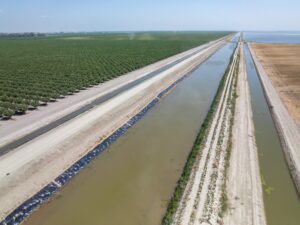Jun 22, 2023Coalition opposes bills to overhaul California water rights rules
As California experiences wild swings in climate from drought to floods, critics of the state’s water rights system seek to overhaul rules that date back to California’s founding in 1850.
Three water rights bills are pending in the California Legislature that would expand the authority of the California State Water Resources Control Board. The bills are opposed by a large coalition that includes dozens of farm groups, water agencies and business groups.


Kristopher Anderson, legislative advocate for the Association of California Water Agencies (ACWA), said the bills “collectively and individually present a foundational change in the way California’s water rights system is implemented, managed and enforced.”
ACWA, which represents more than 460 public water agencies that deliver 90% of water throughout the state, is joined by the California Farm Bureau and others in opposing the three measures:
• Assembly Bill 460, by assembly member Rebecca Bauer-Kahan, D-Orinda, would give the state water board authority to issue interim relief orders to curtail water diversions. The measure also would increase civil fines for violations of the orders.
• AB 1337, by assembly member Buffy Wicks, D-Oakland, would give the water board legal authority to override claims of water rights for the purpose of ordering curtailments.
• Senate Bill 389, by Sen. Ben Allen, D-Santa Monica, would authorize the state board to adopt regulations that enable it to investigate the diversion and use of water from a stream system to determine basis of right.
“The bills would authorize the state water board to impose punitive penalties on even law-abiding water right holders, curtail water rights in any year and strip entities of their water rights,” Anderson said. “This legislation would create a significant amount of uncertainty and lead to unintended consequences, not just for water right holders, but communities and businesses across the state that depend on a reliable water supply.”
The bills, including two passed in the Assembly and one that has cleared the state Senate, follow actions identified in an April report on managing water scarcity underwritten by the state and conducted by the University of California, Berkeley, Center for Law, Energy & the Environment.
The report recommended the Legislature and the state water board establish routine curtailments. “To effectively manage California’s surface water resources, the state needs to implement curtailments on a regular basis, not only in times of extreme crisis,” it said.


California Farm Bureau senior policy advocate Alexandra Biering said the bills are an attempt to tighten enforcement and are a response to past instances of water rights holders ignoring curtailment orders and only paying small fines after diverting water.
“The penalties in place for illegally diverting water have not been a deterrent,” Biering said.
The coalition opposing the measures understands that the state must be agile and responsive to California’s changing hydrology, Biering said, adding, “We want the state water board to be effective, but these are bills that would really upend the water rights system in the state.”
She said the bills go too far in a legislative overreach that could have severe consequences.
“When you’re dealing with something that is one of the bedrock resource inputs for the fourth-largest economy in the world, it is worth being thoughtful, taking your time and doing it right,” Biering said. “With these bills, the state water board would no longer have increased powers during periods of scarcity, but all of the time.”
The coalition emphasized the state’s water-priority system plays an essential role in the California economy, affecting water management, agriculture, housing construction, jobs and water affordability and property values.
“Billions of dollars have been invested over decades to ensure that we can capture and store water to serve Californians in all types of water years,” Anderson said. “The water system has served as the foundation of those types of investments, so this idea of wholesale change to the water right system does create a significant amount of uncertainty for water rights holders.”
According to ACWA, credit-rating agencies have begun to ask how pending water rights bills could affect land values, finance and investments in new water projects.
Buyers and landowners fled areas that are now seen as water insecure, said rural appraiser Janie Gatzman, adding that the trend will increase where water rights are less secure and water is less abundant.
“It’s very expensive to farm in California,” she said. “Most farmers have to have a loan on their property to farm, so now, loan-to-value ratios are getting into dangerous territory, especially with a drop in nut prices.”
“There are a lot of people farming in the red and have been farming in the red for the past several years,” she added. “Go and decrease their land value, and their banker’s going to come and call the loan due.”
Increased regulations, Gatzman said, ultimately impact farmworkers and associated businesses, such as irrigation supply companies, nurseries, crop consultants and equipment dealers.
“All of the communities rely on a healthy ag economy. What are they going to do if values decline this much?” Gatzman said. “We’ve already seen that happen in Westlands (Water District) with so much land going unplanted due to no water.”














